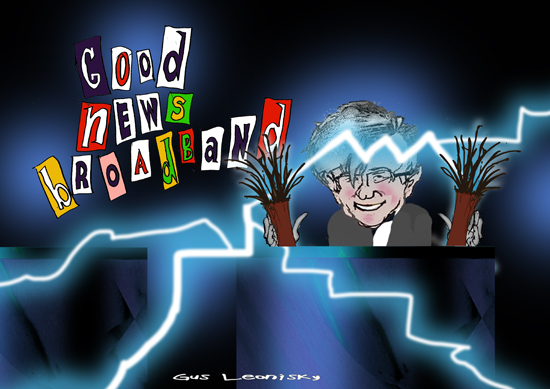Search
Recent comments
- corrupt....
3 hours 8 min ago - laughing....
5 hours 2 min ago - meanwhile....
6 hours 31 min ago - a long day....
8 hours 25 min ago - pressure....
9 hours 12 min ago - peer pressure....
1 day 31 min ago - strike back....
1 day 37 min ago - israel paid....
1 day 1 hour ago - on earth....
1 day 6 hours ago - distraction....
1 day 7 hours ago
Democracy Links
Member's Off-site Blogs
bandstand .....

Debate is raging over whether the Federal Government's new $43 billion national broadband strategy is a 21st century infrastructure must-have or a grandiose "highway to nowhere".
The Government has abandoned its plan for a smaller, privately built network, instead opting to be the majority shareholder in a special company to deliver super-fast broadband to 90 per cent of all homes, schools and workplaces.The Opposition is sceptical the Government can raise so much money in a global recession to make broadband affordable.
Gone is the Government's election plan to invest $4.7 billion, with a similar amount from the private sector, for a fibre-to-the-node broadband network.http://www.abc.net.au/news/stories/2009/04/07/2537687.htm
meanwhile …..
If you get excited about the prospect of really, really fast broadband Internet service, here’s a statistic that will make heart race. Or your blood boil. Or both.
Pretty much the fastest consumer broadband in the world is the 160-megabit-per-second service offered by J:Com, the largest cable company in Japan. Here’s how much the company had to invest to upgrade its network to provide that speed: $20 per home passed.
The cable modem needed for that speed costs about $60, compared with about $30 for the current generation.By contrast, Verizon is spending an average of $817 per home passed to wire neighborhoods for its FiOS fiber optic network and another $716 for equipment and labor in each home that subscribes, according to Sanford C. Bernstein & Company.
Those numbers from Japan came from Michael T. Fries, the chief executive of Liberty Global, the American company that operates J:Com.His larger point: “To me, this just isn’t an expensive capital investment,” he said.
The experience in Japan suggests that the major cable systems in the United States might be able to increase the speed of their broadband service by five to 10 times right away. They might not need to charge much more for it than they do now and they’d still make as much money.- By Gus Leonisky at 9 Apr 2009 - 11:19pm
- Gus Leonisky's blog
- Login or register to post comments
elastic wiring...
From the ABC
The Federal Government is under increasing pressure to show how much its ambitious $43 billion plan for a national broadband network will cost for households and whether it is commercially viable.
Prime Minister Kevin Rudd unveiled the plan yesterday after scrapping the Government's 18-month tender process.
Mr Rudd said the new fibre-to-the-home network would take eight years to build, cost $43 billion, and give 90 per cent of Australian households download speeds 100 times faster than they currently experience.
The Government will form a company to build and operate the network of which it will hold a 51 per cent stake, with the remainder coming from private investment.
But some analysts say the plan will cause broadband costs to rise, especially if there is not a large demand from households for the service.
The Federal Opposition has condemned the plan and is demanding the Government explain what the cost will be.
Finance Minister Lindsay Tanner has told Sky News he cannot name a price but he insists the plan is financially viable.
"It's a bit of a pointless exercise to nominate a figure because it's not going to be exactly the same today as it'll be tomorrow, as it'll be the following day," he said.
---------
see the light in the top cartoon...